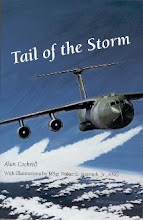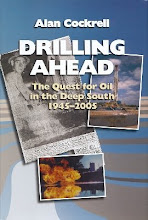I know. You’ve had your fill of my doleful lamentations
about my many trips over the Andes Mountains, their splendor denied me by
darkness. Both going and coming to destinations in the Deep South (ain’t
talking about Mobile here) we pass over or near, in high silent pitch
blackness, the second highest mountain range on the planet. It’s as if we have
been forbidden by its creator and/or our scheduler to lay eyes on it,
insignificant and unworthy specks that we are. Yet sometimes the Moon will,
with a wink, pull back the ebony veil and show us a teasing glimpse below—a
ghostly sheen of light reflected a quarter million miles onto the Andes’ soaring
slopes.
But last week—thanks to the Sun’s annual pilgrimage to
the December solstice—we were permitted a marvelous vista in broad daylight. The
spectacle even inspired Bruce, our relief pilot, to hatch an idea that would
hopefully enhance his quest for romance back home in Tulsa, which at that
moment seemed about a million miles tailward.
Southbound, toward Buenos Aires, the sun was rising on
the left just as I came back up from break—the middle of the three 3-hour
breaks. Bruce, a bald and robust man in his mid-fifties, heaved himself out of
my seat and went aft for a pee-break. Dave, the co-pilot, fortyish, sharp with
book knowledge and eager to share it, briefed me on our progress. “We were two
minutes early at the last waypoint and 1500 pounds down on the fuel.” I nodded.
I punched the PROG button on the FMS. It predicted we would arrive at BA with
enough gas to shoot an approach and then bolt for Montevideo if we couldn’t get
in. But the forecast was CAVU, so we expected no fuel woes. “Oh,” Dave said,
rubbing scratchy, tired eye sockets, “We’re comin’ up on the second terrain
escape procedure.” I nodded again. We were about to cross the highest terrain
on our route.
Bruce returned with coffee in hand and slid into the
right seat. Then we bade goodnight to Dave as he disappeared into the dark
bowels of the 767 for his break, the third and final one. I donned sunglasses
and set the shades on my left side to filter the lazer brilliance coming out of
the east.
Bruce—a Bostonian living like a fish out of water in
Oklahoma— didn’t strike me as the kind of guy who thrilled too much over
natural panoramas. He had seen his share of them in his Air Force career. He had
zipped low across many a mountain range riding Phantoms and Vipers, been an instructor
at the weapons school at Nellis (“Top Gun” in the navy) and had closed his
career as an F-16 wing commander. I’ve flown with guys who had similar colorful
and exciting backgrounds such as his who were introspective and brooding over
the notion that the best of their lives was behind them.
Not Bruce. His deep Boston accented voice, his hearty
laughs and commanding presence did not belie any regrets about being a 767
relief pilot. He liked it here. He imparted due respect to his captain—me—but
with a skillful touch of tact took command of our coming layover in BA. Before
we had left the ground he had already crafted our dining plans in the greatest
beef-eating city on the planet, diplomatically securing Dave’s and my approval.
But that pleasure was many hours in our future.
The sun had not yet risen high enough to spill its
brilliance on the Andes as I opened my I-Pad to the terrain escape procedure
for our route. It was a precaution in case we lost compression and had to make
a “high dive” to thicker air. We, the crew, have hours of oxygen for our use,
but the passengers have only a few minutes. If the terrain below prevents an
emergency descent you have to know your escape route. I installed the routes on
the EHSI where they showed up as dashed green lines. If we lost pressure we
would plunge no lower than 19,000 feet until established on one of the green
lines headed east. (Think of them as valleys.) Then we could continue down to 10,000—breathable air. By the
time I got the EHSI set up for the procedure, the tops of the Andes lit up, on
fire with the sun’s yellow rays.
“Wow!” I said to Bruce. “Look at that! We don’t see this
very often.”
He nodded, somewhat unimpressed with it all, and gazed
out front. His expression changed when I said, “It’s the Big Crunch.”
He asked what I meant. I explained how the collision of
the
South American continental plate and the south Pacific plate had thrust the Andes up. His face lit up. He wanted to know more. I talked on. He asked me to diagram the concept, which I did on the back of a flight plan page. His questions came faster; his building enthusiasm for the geology excited me. I love thus stuff, although I don’t pretend to understand it in the depth of modern academic standards. Finally Bruce sat back and took it all in, smiling contentedly. He shook his head with a grin. “Just wait till I tell her this,” he mumbled. I asked who. “My girlfriend!” he said with an even bigger grin.
South American continental plate and the south Pacific plate had thrust the Andes up. His face lit up. He wanted to know more. I talked on. He asked me to diagram the concept, which I did on the back of a flight plan page. His questions came faster; his building enthusiasm for the geology excited me. I love thus stuff, although I don’t pretend to understand it in the depth of modern academic standards. Finally Bruce sat back and took it all in, smiling contentedly. He shook his head with a grin. “Just wait till I tell her this,” he mumbled. I asked who. “My girlfriend!” he said with an even bigger grin.
Turns out Bruce had met a woman who vacationed in the
lake house next to his. She was a geologist with an oil company. His world and
hers were so different communication
wasn’t easy, even for a gregarious guy like himself. But now Bruce had the
tools to break the ice. “She’ll love this,” he said, raising his camera for
numerous shots ahead and out to his side. “Now what did you call that again?”
he asked, gesturing to the parallel ridges out front.
“Folds,” I said. “If you really want to impress her, use
the terms ‘anticlines’ and ‘synclines.’” He had captured me into his scheme.
He jotted the terms down and shook his head in abject
delight. “She’s gonna love this!”
Now I had become not purveyor of scientific knowledge but
an aider and abettor—a source of clever tools to help him achieve an intimate
objective. But that was okay.
We drank in the
grandeur of the Andes—a rare and not soon to be forgotten sight. And if Bruce’s
plans materialize he will be hearing much, much more about the Big Crunch.









